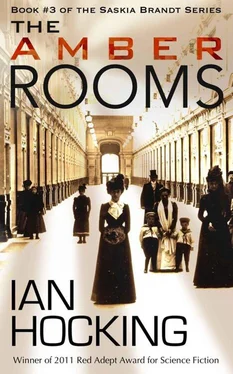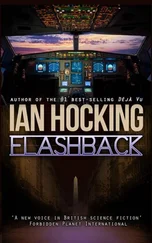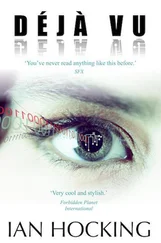‘They won’t slow. How many?’
Saskia concentrated on the black dot. She felt an expansion of the percept, though she saw no magnification. There were two Cossack guards in front of the stagecoach and two behind. Another two galloped alongside. She saw a rifle inside the carriage, and at once she understood that there was a soldier inside, along with the cashier, Kurdyumov, and the accountant, Golovnya.
‘As many as we thought.’
‘Make the signal.’
Saskia withdrew the Circassian sabre and held it high. She caught the sun on the blade once, twice, three times.
‘Well?’ asked Kamo. ‘Did they see it?’
‘There’s nobody on the roof of the palace.’
‘What? Damn him, the traitor. Give me the sabre. I’ll make the signal. Go.’
Saskia spurred her horse down into the switchbacks. Grit and scree loosened beneath the hooves but the steady warmblood had her trust and soon they entered a rhythm where her balance spoke to the animal. Moments came when she almost fell from the saddle, but she relaxed, with a sure concentration, and the rapport was re-established. The heat grew as they descended. Sweat ran into her corset and rubbed her forehead raw beneath her plumed cavalry hat.
As the slopes flattened, she entered the city through washing lines and fields. Then she was into the streets. The crannies and turns were foetid with spice, urine, horse shit and dust. Its people were, too, a Caucasian miscellany of Georgian, Russian, Armenian and Azeri. Saskia still labelling. Still counting like the doomed accountant Golovnya.
Saskia pulled the horse through a corner and trotted down Golovinsky Avenue. There were gendarmes and militiamen on every corner. They knew something was afoot. Saskia kept her back straight. Her jaw twisted a little to the left. She rode with the airs of a captain to suit her stolen clothes and her glued sideburns. Outside the opera house, Patsia Goldava stopped the horse and twirled, girlishly, a parasol. Saskia saw that her parasol was open. It was a signal: Nothing yet. Saskia corrected her by touching her cap.
‘They’re coming?’ Patsia whispered, shocked.
Saskia grimaced at her stupidity. Within hearing distance were four blue-uniformed gendarmes and a Cossack. Saskia gunned the horse and passed Patsia before the girl could apologise and double her mistake.
Yerevan Square, which Soso had indicated to her on that first day, was a sun-beaten flatness spotted with water carriers, carts, prostitutes, and lazy men watching the world. Saskia noticed Cossacks and gendarmes looking out from the protection of the Caravanserai, whose shadows cut deep in the bright sunlight. Beside them, some urchins were playing rough-and-tumble in the dust. She recognised them as Soso’s message carriers. She had seen them only that morning outside the Adamia tavern, as, inside, Kamo repeated the plan to his crew of roofless princes, the poor, the adventurous, and the political: the Outfit.
She glanced back to the Military Headquarters. Patsia Goldava had joined with Anneta Sulakvelidze and they made a pretty pair. Both had parasols. Both carried Mauser pistols, hidden.
In moments, the square would become a scene of turbulence, noise and blood. Saskia could not take a full breath because of the corset. She focused on a young woman crossing the square. Her expensive dress suggested that she was the wife of one of the army officers. Behind her stumbled a crying child. Saskia wondered what the
( 10:32 and eight seconds )
time was and she stood high and
( nine )
could see the roof of Prince Subatov’s palace and, leaning on the balcony rail, the poet Soselo—or the Milkman, or the Pockmarked One, or Joe Pox, or Josef Vissarionovich Djugashvili—who was not yet calling himself Stalin as far as Saskia could tell. Had he seen the signal? Was Kamo still brandishing the sword? There Soso stood like a man set to deliver a monologue over the coming sorrows.
At the corner of the square, Bachua Kupriashvili folded his copy of the Georgia Arrow . That was signal that the stagecoach had been sighted. When it approached, he would lower the newspaper. Saskia trotted towards the street that led to the square. There were too many people. They would be trampled when the stagecoach came. Water-carriers rested near the gutter covers. A white-robed trainee priest crossed the street eating bread. Saskia growled at Kupriashvili. It was his job to limit civilian casualties. She drew a pistol and fired it at the sky.
‘In the name of the Tsar, clear the street!’
Her scream—highly pitched for a cavalry captain—was met with indifference by the citizens of Tiflis. Only the gendarmes and policeman—and the members of the Outfit who marked them—looked at her. Those in the Outfit did not care to hear her instructions. She was just the Prussian favoured by Soso. They had seen Bachua Kupriashvili fold his newspaper, and they were set to liberate a good deal of money.
She pulled her horse into a rear and fired another shot.
‘Clear the square!’
She looked at Kupriashvili.
He lowered his newspaper.
So she dug into the horse and trotted along the boulevard, scattering the people. They shouted and cursed. A young man reached for her reins but she kicked him aside. A great rumbling sound rushed to her ears and, before she could rollback the horse, the convoy roared into the square. Two Cossacks made the vanguard. Then came the carriages. The first contained the state cashier and accountant. The second bore policemen and soldiers. Last, two Cossacks formed the rear. Saskia shared a look with the nearest Cossack through the dust. He looked at her hair and her uniform and her chest. She spurred her horse after them.
As the carriages began their turn into Sololaki Street, Saskia looked for Soso on the rooftop of Prince Subatov’s mansion. Now . He threw a fist-sized object that scudded across the square, a perfect lob, through the spokes of the first carriage, where it rolled and exploded with a punch that Saskia felt through her horse and in her chest. At once, there was a cloud in Yerevan Square. Before it could clear, Anneta Sulakvelidze ran past Saskia, pulled the fuse on her own grenade, and tossed it, too, under the carriages. It detonated with the same simple thunder. Three more, from three nameless men, followed it.
Saskia looked at a Cossack who slid towards her through the murk. He had no legs. Her horse backed away.
She counted each of the bombs and reached ten before her horse lost its calm and shrugged her off. She fell onto wooden splinters and bent nails. Rolling, she stood and pulled the bows on her coat and let it fall open to her pistol. She approached the hopeless Cossack. He nodded for the bullet and she put it through his head.
Sand was falling from the sky. The cloud began to disperse. She walked in a circle. Where was her horse?
Her left shoulder-board disappeared in a puff of fabric. Saskia turned and shot a rooftop policeman through the arm. Then she walked through the dust, spitting it and still deaf, and alternated fire into the three maimed Cossacks. The first carriage had lost its windows and its shape. Its horses were gutted and still. She shot them. In the second carriage, all the soldiers and policeman were dead. They had exploded where they sat.
A footman walked around the edge of the carriage. Saskia did not kill him but Kupriashvili dropped him with an executioner’s shot to the ear and shouted at Saskia, but she could not hear him.
He was pointing behind her.
She turned to see the first carriage—and the money—disappearing down the hill to the Soldiers’ Bazaar. How? The horse had lost its belly and carried one of Saskia’s bullets in its head. She aimed another shot at its flank but the eager crew of the Outfit, tantalised by the money satchels, danced after it and spoiled the shot.
Читать дальше












